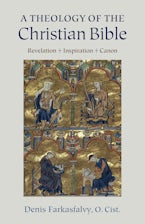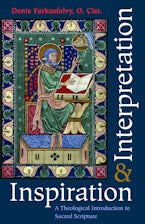- Home
- Verbum Domini
- religion
- A Biblical Path to the Triune God
Preparing your PDF for download...
There was a problem with your download, please contact the server administrator.
A Biblical Path to the Triune God
Jesus, Paul, and the Revelation of the Trinity
Verbum Domini
Foreword by Bruce D. Marshall
Edited by Thomas Esposito
Imprint: Catholic University of America Press
This short volume, finished just before Denis Farkasfalvy’s death in 2020, serves effectively as his last theological testament. Throughout his scholarly career, Farkasfalvy aimed to reconcile and unite theological disciplines that had increasingly become isolated from each other, most notably the biblical, patristic, and systematic. In A Biblical Path to the Triune God, the Cistercian abbot identifies the earliest biblical witnesses to the Church’s teaching about God, formulated at the Council of Nicaea, as Father, Son, and Holy Spirit.
Jesus’ famous praise of the Father, found almost word-for-word in Matthew 11:25-27 and Luke 10:21-22, is Farkasfalvy’s point of departure for his bold assertion that in the earliest sources, we find abundant evidence that "it was not Jesus who revealed his own divine sonship; rather, the Father revealed it to those whom Jesus had chosen and were open to respond in faith." Farkasfalvy demonstrates that Jesus reveals his relationship to the Father in terms of intimate and experiential knowledge, transforming the procreative metaphor of filiation from the physical (as in the Psalms and 2 Samuel 7) to the epistemological realm of knowledge, what he calls "love within cognitive dimensions." Just decades after Jesus’ ministry, numerous independent apostolic witnesses, from the Synoptic Gospels and John to Paul (especially Romans 1:1-4 and Galatians 1:15-16), indicate a robust and widespread understanding of the Father’s self-disclosure in Jesus the Son.
Farkasfalvy concludes his brief but intense reflection by outlining how a single organic process of revelation binds together the Father and the Son, and then extends that loving communion to believers in the Spirit, a communion made possible only by the incarnate Son’s crucifixion and subsequent glorification. This book accomplishes the admirable feat of showing that far from being the invention of later centuries, the Trinitarian doctrine of the Church is firmly rooted in the very first reflections on Jesus’ ministry and mystery by the biblical authors.
Denis Farfkasfalvy, O. Cist (1936-2020) was a research scholar at the University of Dallas and the author of A Theology of the Christian Bible: Revelation - Inspiration - Canon and Inspiration and Interpretation: A Theological Introduction to Sacred Scripture (both CUA Press). Bruce D. Marshall is professor of theology, Southern Methodist University. Thomas Esposito, O. Cist. is assistant professor at the University of Dallas.
"A notable omission within the resurgence of historical and systematic treatments of Trinitarian doctrine in the last decades has been a serious and rigorous attempt to show, by the application of modern historical-critical methods, that Jesus himself taught his disciples the core substance of the doctrine of the Trinity later formulated by the Church. Fr. Farkasfalvy's brilliant execution of this task in this book makes it indispensable for both scholarship and intelligent Christian discipleship."
~Khaled Anatolios, University of Notre Dame
"Crowning a lifetime of learned meditation on Scripture, Abbot Denis Farkasfalvy takes up a question that many scholars have presumed unanswerable: how was the foundation for the doctrine of the Trinity laid in the pre-Resurrection period? Farkasfalvy argues plausibly that the core of this revelation lay in Jesus’ appropriation of the Davidic tradition of divine sonship, which the Father confirmed in the power of the Spirit. Both exegetes and systematic theologians will profit from the book’s lightly-worn erudition and refreshing independence of judgment."
~Aaron Pidel, SJ, Marquette University
"Two of the most distinctive and controversial beliefs of the classic Christian creeds are the divine incarnation of Jesus Christ and the Trinity. When attempted today, most defenses of these historic doctrines are grounded in philosophical or linguistic claims. In this brief yet carefully argued work, Fr. Denis Farkasfalvy impressively establishes the Nicean confessions of the Incarnation and the Trinity within guidelines used in historical criticism of the New Testament."
~Wendell Willis, Abilene Christian University
"This brief but substantial study bears the marks of [Farkasfalvy’s] characteristic erudition and deep Catholic faith… Although some biblical interpreters shy away from the attempt to discover evidence of the Trinity in the Bible itself—relegating the question to later Christian tradition—Farkasfalvy sets out to show that evidence of the Triune God is already present in Jesus himself and in the earliest Christian tradition."
~The Bible Today



